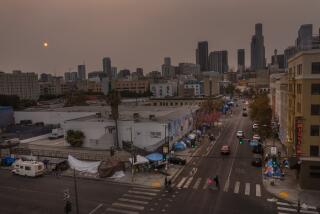Op-Ed: LAPD can build trust with release of video in fatal skid row shooting
The fatal shooting of Charly Leundeu Keunang on the streets of skid row is a test of the Los Angeles Police Department’s new body camera program and the department’s ability to handle officer-involved shootings in a way the public can trust. So far, the LAPD isn’t passing the test.
Building and maintaining trust requires a steadfast commitment to a transparent, objective process when it comes to assessing such shootings. LAPD Chief Charlie Beck has promised a comprehensive investigation of the Keunang shooting, and he has rightly cautioned the public against leaping to conclusions before all the facts are in. But Beck and his department aren’t following that counsel.
The chief is withholding the video shot by the body cameras worn by two of the four officers involved. Yet unnamed police sources have leaked reports of what the cameras purportedly recorded. Those leaks, and the chief’s statements concerning bystander video and revelations from the in-process investigation, strongly suggest one conclusion: The shooting was justified. That finding, however, has yet to be determined.
When it comes to the body camera video, the LAPD can’t have it both ways: Either the video is part of the public discussion at this point in the investigation or it is not. Its disclosure would allow the public to decide for itself what happened. Withholding it thwarts openness and accountability, and erodes trust between police and the public, especially in communities whose members have been subject to “suppression policing” by the LAPD. It fuels concerns that the department doesn’t trust the public to judge for itself or, worse, that the department is trying to hide something.
The department’s claim that it could not release the video during an investigation are undercut by its policies for the body camera pilot program set forth in a January 2014 memo. The policy requires officers involved in a shooting to view body camera video before making an initial statement about what happened. If the department is truly committed to preserving the integrity of investigations, it should require officers to provide their statements about any use-of-force incident before viewing the videos.
Moreover, Beck and other department sources have worked consistently to construct a narrative around the incident in defense of the shooting. As quoted in The Times and the Associated Press, they have described Keunang as “repeatedly refusing to comply with officers’ commands” and the officers as acting “compassionately” until the moment when force became necessary.
At a news conference on the Monday after the shooting, Beck said that Keunang “forcibly grabbed one of the officers’ holstered pistols” and that the gun itself showed signs “indicative of a struggle over the weapon.” Beck has been careful to say he has reserved judgment on whether the officers acted lawfully or within policy, but his other public statements sound as though he decided key facts long before all witnesses could have been interviewed and all the evidence reviewed.
The department also appears to have released information about the victim’s criminal history to the media. As understandable as that might be, it plays out unfairly. It amounts to one-sided revelations. Similar scrutiny of a police officer’s past is impossible because a state law shields police personnel records from the public, even records involving civilian complaints, sustained misconduct and patterns related to the uses of deadly force. If the victim’s history is relevant to the public’s understanding of the incident, surely so is an officer’s prior conduct.
The police role in the death of Keunang among others — including the fatal shooting of Ezell Ford in August, the fatal beating of Omar Abrego in August and the death of skid row resident Carlos Ocana, who fell off a rooftop after police shot him with nonlethal ammunition in May — reignites memories of the LAPD’s troubled past. It raises fundamental questions about the way the department polices our communities and plunges L.A. into the national debate over police practices.
Police perform an extremely important and dangerous public service. Those dangers, however, do not trump the public’s right to know all the facts. Beck must see public scrutiny not as a threat but as an opportunity.
Rather than focus on protecting officers from immediate criticism, he should focus on the crucial task of maintaining confidence in the police and the department’s procedures. The surest way to truly gain the public’s full confidence is to release the body camera video, scrupulously withhold judgment on the events that led up to the shooting, and get on with the investigation.
Hector Villagra is executive director of the ACLU of Southern California.
Follow the Opinion section on Twitter @latimesopinion and Facebook
More to Read
A cure for the common opinion
Get thought-provoking perspectives with our weekly newsletter.
You may occasionally receive promotional content from the Los Angeles Times.










